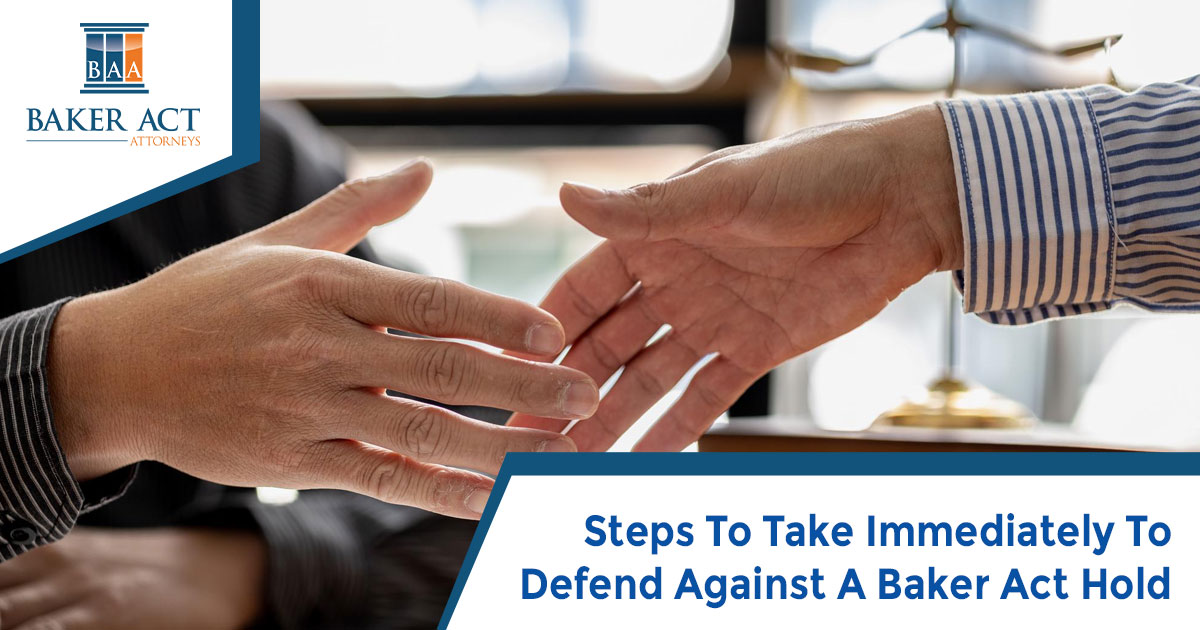Finding out that your loved one is being subjected to a Baker Act hold can be a distressing and bewildering experience. When you don’t know where to turn to secure your loved one’s release, contacting an attorney who has expertise in defending against Baker Act holds should be the first step you take. The sooner you act to challenge your loved one’s detention, the more quickly they can be released to receive appropriate support for their circumstances.
What Is A Baker Act Hold?
A Baker Act hold, formally known as involuntary detention under the Baker Act, occurs when a person is taken into custody and delivered to a psychiatric facility for evaluation and treatment. A person can only be Baker Acted when they meet specific criteria set out in the Act, namely:
- They are experiencing mental or emotional impairment to such an extent that they can no longer meet the demands of daily life, or they are unable to perceive reality;
- As a result, the person cannot ascertain whether they need psychiatric examination and treatment, or they have already refused to have an evaluation; and
- If they are not stabilized and given treatment, they are likely to suffer neglect because they are unable to care for themselves, or they are likely to harm themselves or others.
The criteria listed above are intended to cover scenarios in which a person is experiencing a mental health crisis and needs immediate assessment and stabilization. Unfortunately, in some cases, these criteria are misapplied and a person is wrongfully taken into detention. To successfully defend against a Baker Act hold in these circumstances, immediate action must be taken.

Who Can Carry Out A Baker Act Hold?
Before we discuss how to defend against a Baker Act hold, it’s important to understand how an involuntary hold can come about. There are three main routes to involuntary detention under the Baker Act. The first is following a court order: a concerned family member, friend or other interested party may bring a ‘petition for involuntary examination’, stating under oath that they believe the person who is the subject of the proceedings meets the criteria for involuntary detention. If the court grants the order, the person will be taken by law enforcement to the nearest receiving facility.
The second way a person might be detained under the Act is by a law enforcement officer who has reason to believe the person meets the criteria set out above. Although law enforcement officers must have good grounds for exercising their discretion to take someone into custody under the Baker Act, in some cases they exercise this discretion improperly. These tend to be the most common Baker Act hold defense cases that Baker Act attorneys deal with.
Finally, a person may be detained on the instructions of a qualified professional who has examined them and thinks they meet the criteria for involuntary detention. The physician may need to secure the assistance of law enforcement to have the person taken to a receiving facility.

What Immediate Steps Should You Take To Defend Against A Baker Act Hold?
If you or a loved one have been taken into custody in terms of the Baker Act, it’s important to know that the maximum initial holding period is 72 hours (in the case of minors, this period is limited to 12 hours). However, although your loved one can only be held for up to 72 hours, that’s not a reason to wait out the detention period: there is a risk that they will be held for much longer if the receiving facility they have been taken to brings a court petition for involuntary placement (i.e., involuntary long-term psychiatric treatment). If this petition is granted, your loved one could be kept in a facility for up to six months. For this reason, it’s vital you take steps to defend against their Baker Act hold as soon as possible, starting with those suggested below.
1. Contact a reputable Baker Act attorney
It’s an unfortunate reality that law enforcement officers, court officials, and medical personnel tend to take inquiries and interventions from lawyers more seriously than those from lay people. By having an experienced Baker Act attorney by your side, you’ll be able to get answers quickly about the circumstances of your loved one’s detention. Your attorney may even be able to persuade the treatment facility to discharge your loved one without the need for a court hearing. More generally, an attorney will be able to guide you through the legal and administrative processes that need to be followed to secure your loved one’s release.
2. Gather evidence
A key step in preparing to defend against a Baker Act hold is gathering evidence that demonstrates your loved one is of sound mind and not a danger to themselves or others. Medical records and witness statements from family members, friends, and colleagues are especially useful for this purpose. You may also want to collect evidence regarding the circumstances of the wrongful detention itself: for example, if you intend to argue that a flawed process was followed, or want to show that your loved one mistakenly took too much medication for an illness and was not trying to self-harm, then you should try to gather evidence to substantiate the particular argument you’re making.
3. Request an emergency hearing
If the treatment facility is refusing to discharge your loved one after repeated requests, then your next step is to request an emergency hearing to petition the court to order your loved one’s release. There are several legal strategies that can be used, but one of the most effective ways to defend against a Baker Act hold is to bring a petition for a writ of habeas corpus. Briefly, this petition allows you to challenge the basis and validity of your loved one’s detention, or allege that their rights have been violated through an unfair procedure. Your attorney will bring this petition on your behalf, assemble and present relevant evidence, and argue the petition in court. It is virtually impossible for a patient to file their own habeas petition, and only a Florida Barred attorney can file a habeas petition on their behalf.
Acting Quickly To Defend A Baker Act Hold Can Make All The Difference
Involuntary Baker Act detentions have become a normal part of Florida’s legal framework for offering support and care to those struggling with acute mental illness. However, when things go wrong, and someone is unlawfully Baker Acted without a sound legal basis, swift action must be taken to secure their release within the 72-hour window before they are held for extended detention.
At Baker Act attorneys, we are committed to providing round-the-clock legal guidance and representation for families affected by improper Baker Act holds. We’ll advocate for your loved one’s rights and do everything in our power to help you secure their immediate release. If you require emergency assistance, contact us today at 855-429-0074 and we’ll take care of the rest.

